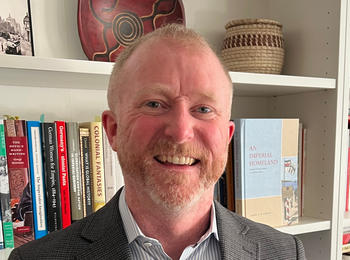Prof. Dr. Adam A. Blackler

Friedrich-Meinecke-Institut
Global History
Visiting Scholar (October 2024 - July 2025)
Dr. Adam A. Blackler is an associate professor of history at the University of Wyoming. He is a historian of modern Germany and southern Africa, whose research emphasizes the transnational dimensions of imperial occupation and settler-colonial violence in the nineteenth and twentieth centuries. His scholarly interests also include the political and social dynamics of Germany’s Weimar Republic and the interdisciplinary fields of holocaust & genocide Studies and international human rights.
Dr. Blackler’s first book monograph, entitled An Imperial Homeland: Forging German Identity in Southwest Africa, appeared in September 2022 in the Pennsylvania State University Press’s series “Germans Beyond Europe” sponsored by the Max Kade Research Institute. Among his other most recent publications include a co-edited anthology, After the Imperialist Imagination: Two Decades of Research on Global Germany and Its Legacies, and a chapter in the multi-volume collection, A Cultural History of Genocide. He is currently researching a second book-length project, entitled “We remain loyal to the Fatherland!”: Outposts of Empire in Weimar Germany. Dr. Blackler was the recipient of the University of Wyoming’s Extraordinary Merit in Research Award in 2022. He received both the Extraordinary Merit in Teaching Award and John “Jack” P. Ellbogen Meritorious Classroom Teaching Award in 2024. Dr. Blackler joins the Friedrich-Meinecke-Institut as a visiting professor of history funded by the Flittie Meritorious Sabbatical Award.
“We Remain Loyal to the Fatherland”! Outposts of Empire in Weimar Germany
Colonial loss engendered a strong legacy in the Weimar Republic. Expatriates, officials, soldiers, settlers, and “old Africans” (Alte Afrikaner) were among those who particularly grappled with the shame and embarrassment of Germany’s imperial forfeiture after World War I. Though military defeat ended their formal colonial era, imperial enthusiasts continued to circulate fantasies about Germany’s “glorious past” without constraint during the Weimar Republic. They also conveyed optimistic prognoses on the empire’s future in the strongest possible terms. Along with hosting imperial galas, dedicating cemeteries and memorials in Germany and Africa, and mass-producing sensationalist films and literature, colonial exponents worked hard to educate their fellow white citizens about the necessity of empire and its esteemed place in German history. In doing so, they enabled women, men, and children of all backgrounds to forge an imperial narrative that cast cultural myths, pejorative stereotypies, and chauvinistic tropes as proud embodiments of Germany’s rich achievements in the nineteenth and twentieth centuries.
“We remain loyal to the Fatherland!”: Outposts of Empire in Weimar Germany explores how imperial adherents publicly assuaged their humiliated national ego against a backdrop of military defeat, political collapse, and economic catastrophe. This fresh consideration of German colonial revanchism will assign special attention to the municipal districts, city parks, print culture, and global networks that constructed the social topography of the Weimar Republic and its former African colonies. Weimar Germany’s social milieu enabled imperial advocates to advance their aspirations unabatedly and in multiple public venues. Outposts of Empire illustrates how civic engagement with pro-colonial literary works, monuments, and mass spectacles fashioned a revanchist national discourse that persuaded a majority of white women and men to distinguish Germany as a model imperial agent.
As German citizens and former settlers embraced imperial motifs laced with false nostalgia and irredentist logic, physical and discursive outposts of the erstwhile empire obscured the brutal nature of their colonial past. These instruments of colonial revisionism permeated the lexicon of German society and endured long after the Weimar Republic’s political demise in 1933. The consequences of Weimar’s formative post-colonial moment remain paramount today. As recent international controversies over museum exhibitions, memorials such as the Hererostein (Herero Stone) in Berlin’s Columbiadamm Friedhof, imperial reparations, and the repatriation of cultural artifacts all demonstrate, it is essential for us to scrutinize the origins of Germany’s post-colonial memory and how it continues to manipulate events in the present-day world.
Refereed Books
An Imperial Homeland: Forging German Identity in Southwest Africa. University Park, Pennsylvania: Max Kade Research Institute, Pennsylvania State University Press, 2022.
Reviews: in Monatshefte, Seminar: A Journal of Germanic Studies, Transnational German Studies, German History, German Studies Review, Central European History, and others.
Refereed Journal Articles
“From Boondoggle to Settlement Colony: Hendrik Witbooi and the Evolution of Germany’s Imperial Project in Southwest Africa, 1884-1894” Central European History 50, no. 4 (27 December 2017): 449-470.
Volume Editor
After the Imperialist Imagination: Two Decades of Research on Global Germany and Its Legacies. Oxford: Peter Lang Press, 2020, edited and introduced with Sara Pugach and David Pizzo.
Book Chapters
“Popularizing the Nation: Colonial Literature and the Imperial Imagination,” Race Theory inEnlightenment Anthropology: The Conceptual Legacy, eds. Daniel Purdy and Robert Bernasconi. Oxford: Oxford University Press, forthcoming.
“German Africa,” Slavery, Colonialism, and Reparations, eds. Adekeye Adebajo and Anita Montoute. Manchester, UK: Manchester University Press, forthcoming.
“Consequences: Settler-Colonialism and Its Eliminatory Repercussions in the Nineteenth Century.” A Cultural History of Genocide: The Long Nineteenth Century. London: Bloomsbury Press, 2021: 141-163.
“The Language of Empire: Aspiring Colonists and the Heimat Ideal in Imperial Germany.” Afterthe Imperialist Imagination: Two Decades of Research on Global Germany and its Legacies. Oxford: Peter Lang Press, 2020: 59-73.
“The Imperialist Imagination 20 years on: The Historiographical Shift Toward a Global Germany.” After the Imperialist Imagination: Two Decades of Research on Global Germany and Its Legacies. Oxford: Peter Lang Press, 2020: 17-56.
Refereed Digital Articles
“After ‘Uprising’: Child Separation and Racial Apartheid in German Southwest Africa,” Age of Revolutions, 30 March 2020, 1-7.
Works in Peer-Review
“‘A Night Under the Palm Trees’: Celebrating Empire in the Weimar Republic,” article manuscript
“‘We remain loyal to the Fatherland!’ Overseas German Colonists after Empire, 1919-1933,” article manuscript




